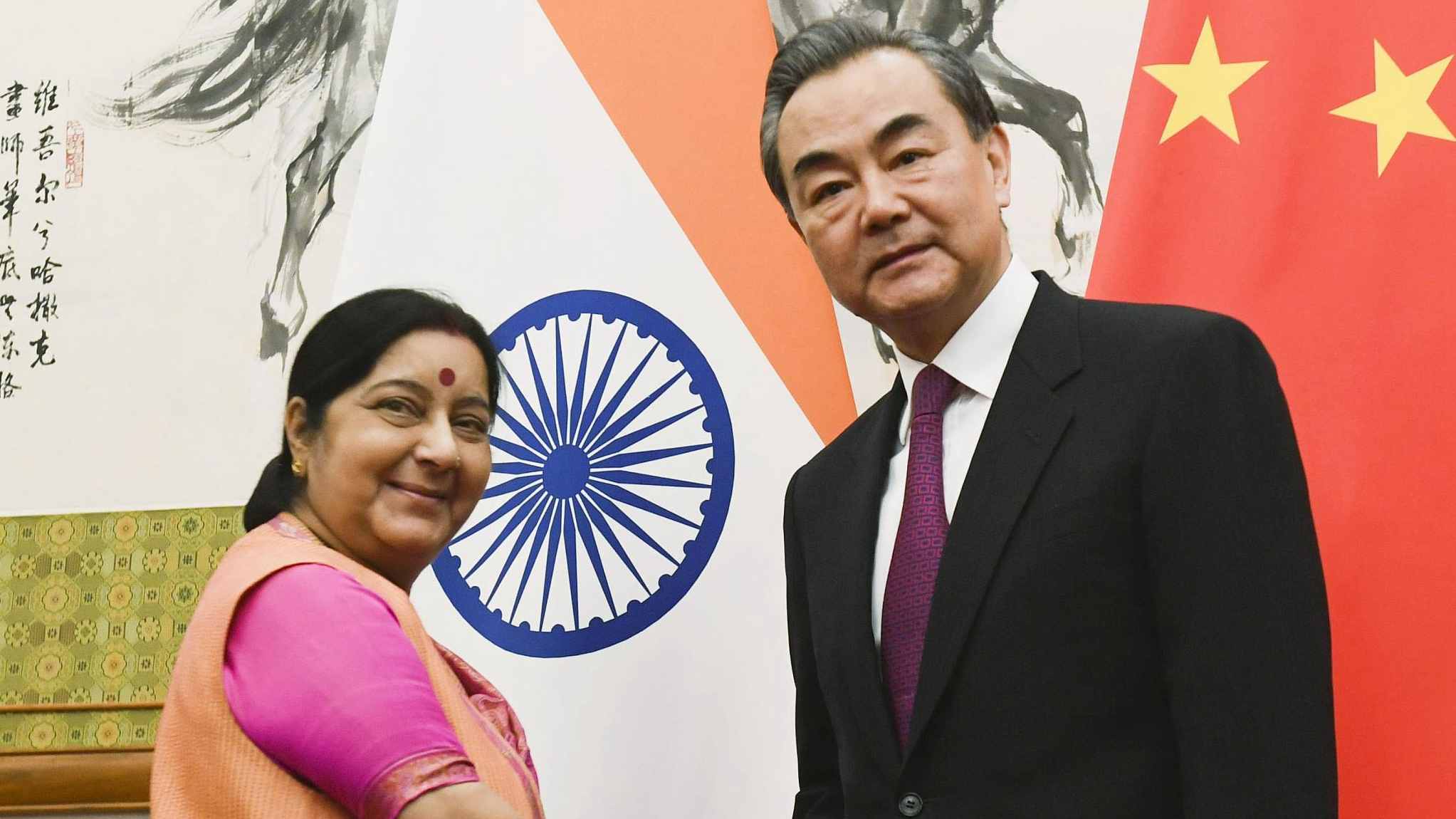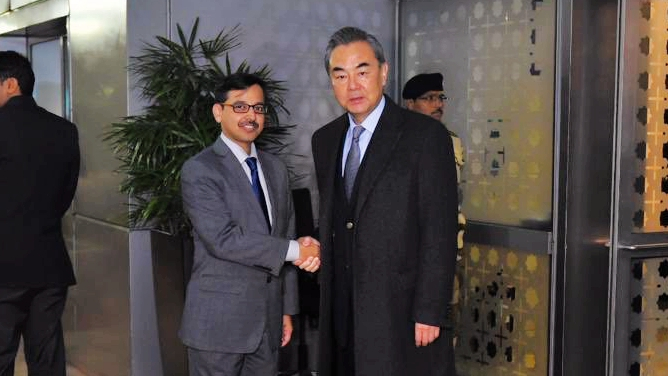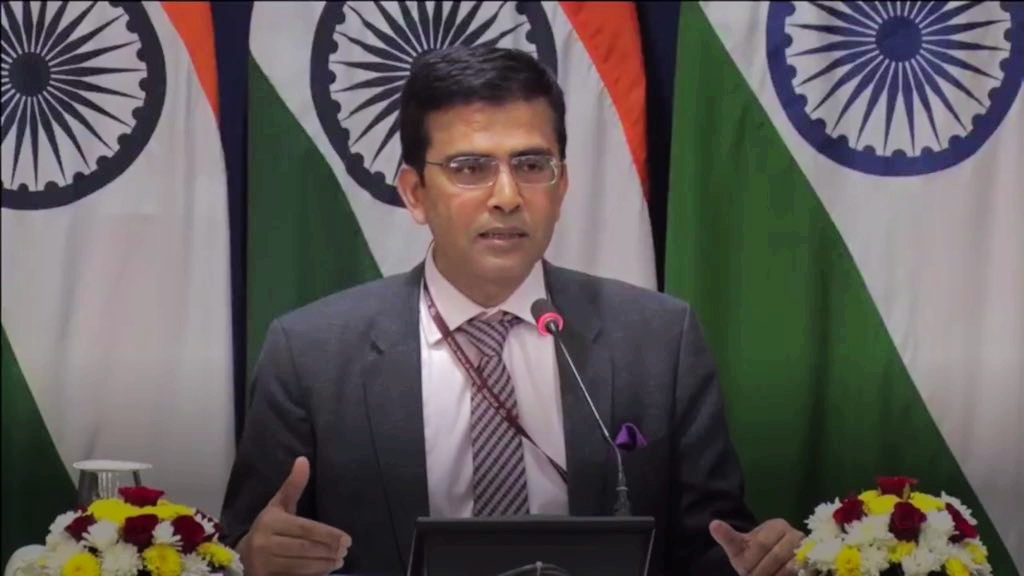
World
13:18, 21-Dec-2018
Wang Yi visits India, says 'dragon' and 'elephant' should duet, not duel
Updated
12:45, 24-Dec-2018
By Abhishek G Bhaya

Beijing reiterated that the Chinese “dragon” and Indian “elephant” should join each other in a duet, not a duel while New Delhi reinforced that collaboration between the neighboring countries are poised to "usher in an Asian Century" as China's State Councilor and Foreign Minister Wang Yi arrived in New Delhi in the wee hours of Friday for a four-day visit to India.
Wang will co-chair the first-ever meeting of China-India High-Level Mechanism on Cultural and People-to-People Exchanges with India's Minister of External Affairs Sushma Swaraj from Dec. 21-24.
"China and India are each other's important neighbors and the world's two largest developing countries. Friendly exchanges and win-win cooperation between China and India will positively affect the evolution of a global landscape and human society," Wang wrote for India's Hindustan Times newspaper a day before the start of his visit.

Chinese State Councilor and Foreign Minister Wang Yi (R) being received by an Indian government official as he arrives in New Delhi in the early hours of December 21, 2018. /Photo via MEA, India
Chinese State Councilor and Foreign Minister Wang Yi (R) being received by an Indian government official as he arrives in New Delhi in the early hours of December 21, 2018. /Photo via MEA, India
Stating that the landmark informal Wuhan summit between Chinese President Xi Jinping and Indian Prime Minister Narendra Modi in April "left a deep imprint" on bilateral relations, Wang wrote how President Xi during the summit emphasized that the Chinese “dragon” and Indian “elephant” should join each other in a duet, not a duel.
"PM Modi responded saying that when India and China work together, 1+1 is not 2, but 11," Wang stated, adding that "China will continue to work with India to explore a path for two big neighbors to live side by side for win-win outcomes and contribute our due share to the progress and prosperity of Asia and the world."
Echoing similar views on China-India ties in a message to a conference organized by India-China Think Tanks Forum in New Delhi on Wednesday, the Indian Minister of External Affairs Swaraj stressed that the Asian giants must collaborate in leading the region to an Asian Century.
"As we trace back our civilizational bonds and take inspiration from the spirit of mutual learning kindled by our ancient scholars, our belief in the inherent intellectual connect between our two countries is only reinforced. As our relations are deepening and our regional and international role evolving, there are expectations from our two countries to lead Asia and usher in an 'Asian Century'," she said.
"This edition of the forum is being held as an important component of the newly constituted India-China High-Level Mechanism on Cultural and People-to-People Exchanges…. This underlines the important role of academic and scholarly exchanges in our people-to-people ties," Swaraj added.
Building greater synergies

Raveesh Kumar, spokesperson for India's Ministry of External Affairs, addresses a press conference in New Delhi, December 20, 2018. /Photo via MEA, India
Raveesh Kumar, spokesperson for India's Ministry of External Affairs, addresses a press conference in New Delhi, December 20, 2018. /Photo via MEA, India
The new mechanism reflects the desire of the two sides to build greater synergies in the people-to-people area, Raveesh Kumar, spokesperson for India's Ministry of External Affairs (MEA), explained at a weekly media briefing on Wednesday.
"Under this high-level mechanism, we are bringing all the existing bilateral cultural and people-to-people exchanges between India and China under one roof. So there are a lot of areas which are coming into play now. We are talking about enhancing exchanges in the field of tourism, arts, films, and media…. [also], culture, sports, academic and youth exchanges," he elaborated.
Both Wang and Swaraj will hold talks in New Delhi on Friday afternoon and are expected to sign a number of memoranda of understanding (MoUs) including one on China-India museum cooperation, Kumar revealed.
Media forum
The ministers will later also inaugurate the third China-India High-Level Media Forum, which is being held as part of the new mechanism this year.
Divided in three sessions, the media forum will look into the challenges and opportunities in media cooperation, role of media in promoting closer developmental partnership, and also deliberate on creating a roadmap for media cooperation between the two countries.
China is being represented at the media forum through prominent names such as CGTN, Xinhua News Agency, China Daily, People's Daily, Global Times, and China Radio International (CRI); while the Indian participation includes Doordarshan, ANI, Hindustan Times, Economic Times, Rajya Sabha TV, and India Writes.
India extends new e-visa facility
Meanwhile, in line with the intention to boost people-to-people contact between both the Asian neighbors, India has announced to extend e-visa facility to Chinese nationals in two new categories.
"Pursuant to the ongoing measures to further simplify grant of Indian visa to Chinese nationals visiting India, Government of India has extended the e-visa facility for conference and medical attendant also," according to a statement from the Indian Embassy in China on Wednesday.
Chinese nationals who wish to travel as attendant to e-medical visa holder will now be entitled for the new "e-medical attendant visa," while those intending to visit India to attend a conference, seminar or workshop organized by government ministries and related agencies will be able to apply for the "e-conference visa." Only two e-medical attendant visas will be granted against one e-medical visa.
(Cover: India's External Affairs Minister Sushma Swaraj (L) and China's State Councilor and Foreign Minister Wang Yi in Beijing, April 22, 2018 /VCG Photo)
3786km

SITEMAP
Copyright © 2018 CGTN. Beijing ICP prepared NO.16065310-3
Copyright © 2018 CGTN. Beijing ICP prepared NO.16065310-3